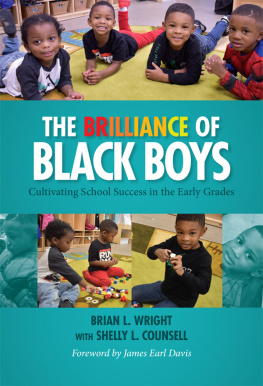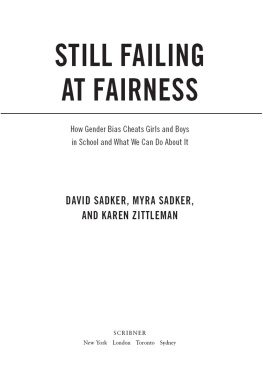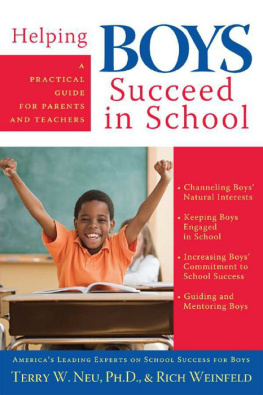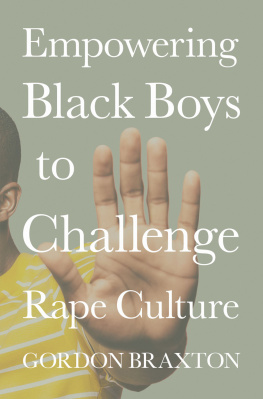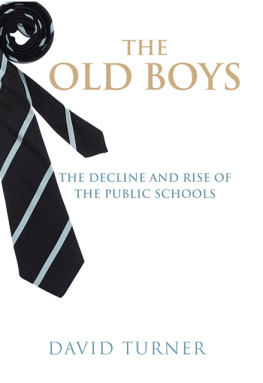To all those who labor in the vineyard without ceasing, to ensure that our young men, our future, and our destiny are secured.
He was like an eagle hovering over its nest, overshadowing its young, Then spreading its wings, lifting them into the air, teaching them to fly.
Deuteronomy 32:11
CONTENTS
CHAPTER ONE
SOMEBODY NEEDS TO HELP THE BOYS
How Can We Stand Up for Young Men?
The knock came on the door of my elementary school classroom while I was sitting at my desk. Another student, one from my younger brothers class, brought in a note for my teacher. I knew what it said: Could David please come speak to his brother? Philip is acting up again.
I had a good reputation in elementary school and I was considered mature for my age. Philips teachers always seemed to think that if anyone could influence him, I could. And so Id get up from my desk and follow the student monitor who had brought the note, out of the classroom and down the hall. The walk felt as if it took a long time. When my brothers teacher saw me, in front of the whole class she would say something like: Your brother is not listening. Hes not being respectful. Ive spoken to him time and again! Soon Im going to have to call your parents, but I thought Id ask you first, David. Maybe hell listen to you. The whole speech was delivered in a tone that I knew drove Phil crazy. His classmates all stared.
My brother would get up from his seat, push in his chair, and the teacher would lead us out into the hallway, where shed say more or less the same thing again. I would answer, Yes, maam, and act as respectfully as I could. Phil wouldnt say a word.
Alone in the hallway, wed both start talking really fast. Id say something like, Whats the matter with you? Dont you know Daddys going to come to school and get you? Dont you know hes going to whup your butt?
Hed say something along the lines of I didnt do it! It was so-and-so and he did this and I didnt do that, but she wouldnt listen. Shes always blaming me! All I did was try to explain!
We both talked at once, rapid fire, until Phil was called back inside. And so it went. Four times a year, we would get our report cards and bring them home. Mine would be full of 90s and 95s; his had several 55s and 60s. And this was head-to-head competition: my brother and I were only eleven months apartI was born in January, and he was born in Decemberand we were in the same grade.
Our father was an involved parent, interested in what we had to say, and as an enthusiastic player in our recreational games, he was always ready to join us for football and such. But he was also a strict, old-school disciplinarian, most of all when it came to our grades. He himself had dropped out of high school and worked years at hard, low-paying, physical jobs, including stints as a shipping clerk and in a mens clothing warehouse. When they first married, my parents, like many young couples, couldnt afford their own apartment; they had to live with my grandfather. My dad came to see that dropping out of school had been an enormous mistake. In time, he earned a GED (a high-school equivalency degree) and started taking civil service exams, winning jobs in the post office, working as a conductor for the Metropolitan Transit Authority, and finally becoming a police officer. That was considered a top-level civil service job, but he soon found that even in his success, he was limited in how far he could climb, how many promotions he could get. To overcome these limits, he studied part-time for many years, earning an undergraduate degree and taking some graduate courses.
Phil says that when he showed Dad his grades, there was no talking permitted. Phil might try to explain: Dad, its a lot of pressure, always going up against an honor-roll student like Dave, but our dad wouldnt hear it. Punishment was his response.
BOY ENERGY
Why wasnt my brother living up to his potential? Ive had decades to think it over, as a brother, a father, a teacher, and a school principal. In part, I see now that he was the classic middle child, always in the first childs shadow. It was worse because we were so close in age. He would have been better off starting school the following September, but as it was, I was always among the oldest kids in my class, and he was always the youngest in his. I had that extra year of maturity going for me, and particularly for boys, maturity can take a while to kick in. Developmentally, he was a year behind in both academics and social maturity; we wondered when he would ever realize his potential. I had many chances to experience early success, while he rarely experienced even the small victories and moments of recognition that help motivate all of us to achieve greater things. He must have felt, from early on, Why am I even trying to be an A student or a well-behaved kid? Im never going to catch up to my older brother. And so he tried to stand out as a smart-aleck.
Phil was not a terror, not out of control, not the kind of kid to get into violence, but he had a lot of energy, even more than the average boy. Part of that energy came from frustration. Energetic, often singled out by his teachers, frustratedhe could be a handful. The teachers tended to lose patience. As each in turn got to know him as an underachieving student and a provocative presence in her classroom, that became his identity. They looked for more of it. He heard an awful lot of Stop it, Philip!
As an adult, I found out from my parents that the teachers and the administration of our school had recommended that Philip be put on medication because, they said, he was too hyper. They made the same recommendation for him that is made for lots of other active boys, black and brown boys most of all. Young men of color are three times more likely to be categorized as mentally retarded or learning disabledblack students, for example, represent 17 percent of students overall but 41 percent of those in special ed classes; and in those classes there are more than twice as many black males as black females.
This doesnt necessarily stem from racism or a bias against boys. The majority of teachers in this country are white and female, and their personal experiences give them little in common with boys like Philip. When they were girls, they probably liked school. Teachers approved of their behavior. They did well. For all those reasons, they may have been inspired to become teachers themselves, but the very strengths that qualified them to be teachers meant that they probably lacked the personal context for understanding a boy like Philipeither why he was so unhappy in the classroom or how his feelings could provoke him to behave in disruptive ways. The result, as Peg Tyre, author of The Trouble with Boys, described it, is that as early as preschool, many young men get into a pattern of negative feedback... based on pretty normal behavior.
Anyone could see that Phil was actually very verbal, very quick-witted. In fact, his intelligence was part of what made him so hard for teachersor anyoneto handle. When a teacher would give him a directive, he might tell her, Youre not my mother and youre not my father. You have no right to tell me what to do! Just the thing to get under a teachers skinand to distract her from seeing the challenges he faced and the help he would require to reach his potential.
Philip was not just angry and mouthy in school, he was also bored. In my experience, smart girls who get bored often have the social skills to play along, but Philip, like a lot of boys, had trouble seeing the purpose in the distant end results of education. Many boys will ask themselves, Why are we doing this? Whats the point? And when they dont find an answer, something practical they can see in front of them, instead of keeping their confusion and frustration to themselves, they act out. They are no less unhappy than the bored girls, but they are far more likely to get punished for it.


